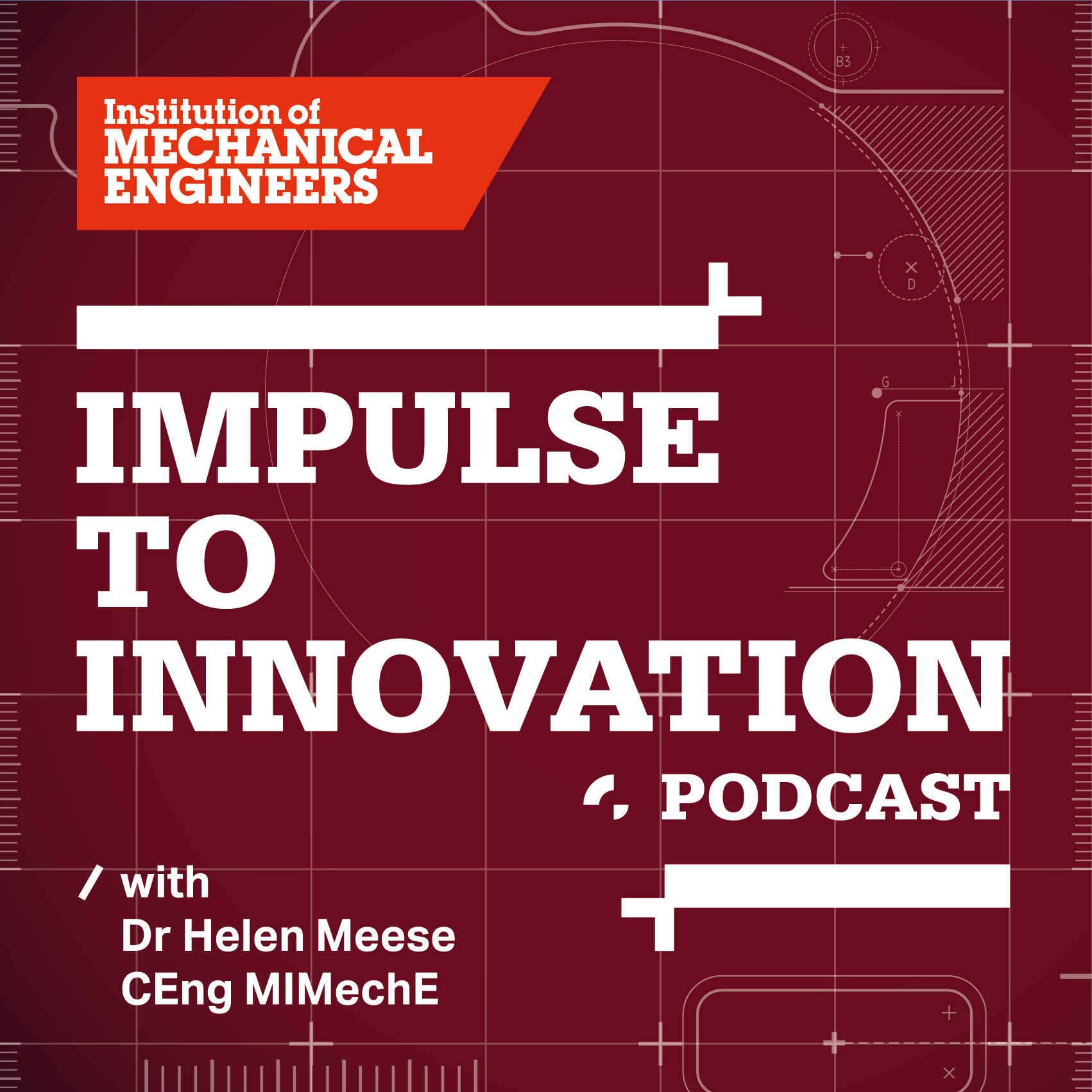Episodes
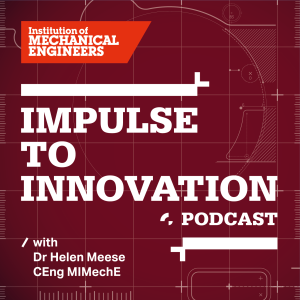
Monday Dec 23, 2024
Monday Dec 23, 2024
One of the many ways members benefit from being part of the IMechE is through its events and webinar programme.

Conferences, lectures and webinars (often generated by the divisions and groups) help to deepen members’ understanding of the latest engineering trends, technical reports and thought leadership as well as providing excellent ways to network and build business relationships.

As we draw to the end of 2024, Helen caught up with Head of Programmes, Frances Shaw to chat about the year’s events, what impact they have had on members, and whats in store for 2025.
Useful Links:
Learning & Development Courses
That’s all for 2024.
In fact that’s all from the Impulse to Innovation podcast as we will not be returning in the new year.
It has been a pleasure over the last 5 years to share the exciting developments and innovations across the world of engineering. We have reached over 109 countries, produced 51 episodes and gained over 1000 followers. I hope you have enjoyed the journey with us and perhaps the show will return again in another format in the future.
So on behalf of myself, Syed Ansar our wonderful AV engineer and the whole Podcast Team at ImechE HQ, I wish you a merry Christmas and a happy new year wherever you are in the world.
Helen Meese, Podcast Host
We would love to hear your thoughts and comments on this episode. If you would like to get in touch, email us at podcast@imeche.org
You can find more information about the work of the IMechE at www.imeche.org

Tuesday Dec 10, 2024
Tuesday Dec 10, 2024
Virtual engineering is a process by which engineers can combine the world around them with a digitally-generated environment, allowing them to visualize an object or location from a totally new perspective.

Credit Advanced VR Research Centre (AVRRC), Loughborough University
While the fundamentals of virtual technology and simulation have been around for some time, particularly in first-person computer games, the application of this technology in the engineering setting is less familiar to most. Yet virtual and immersive simulations have, and are, revolutionising the engineering industry.
Virtual engineering systems are allowing engineers to evaluate product design and customer requirements without the need for hardware or prototype samples and are becoming increasingly common in the automotive and aerospace sectors.

These data-driven simulations enable designers to accurately determine how best to integrate new components into a vehicle before fabricating and testing them, ensuring more efficient and effective products while reducing costs and improving safety.
These virtual processes are however only as good as the digital and mathematical tools and algorithms that drive them, and the design and calibration of these tools requires expert knowledge from across a wide array of engineering subjects.

Credit Advanced VR Research Centre (AVRRC), Loughborough University
Helen's guest is Professor Roy Kalawsky, Royal Academy of Engineering and Airbus Research Chair in Digital and Data Engineering Information Systems at Loughborough University. In addition, Roy is also the Director of the Advanced VR Research Centre and a Fellow of the IET and RSA.

Roy is a pioneer of virtual engineering and has lead the development of numerous VR and AR systems, having established the UK’s first VR lab during the early 1980s. As well as working for BAE Sysems in his early career, he has been involved in highly classified projects for NASA, the US Navy, McDonnell Douglas, Dassault Aviation, the MOD and many others.
His research experience spans the fields of next generation modelling, simulation and visualization and he has undertaken work in the development of digital-twins, co-simulation and machine learning. Whilst his primary research focus is in the aerospace sector, he has achieved important developments in healthcare and other sectors.
Useful Links:
Loughborough University Advanced VR Research Centre (AVRRC)
Virtual Reality in Engineering Blog
We would love to hear your thoughts and comments on this episode. If you would like to get in touch, email us at podcast@imeche.org
You can find more information about the work of the IMechE at www.imeche.org
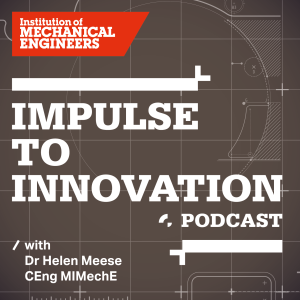
Thursday Oct 31, 2024
Thursday Oct 31, 2024
This episode features a conversation that explores the intersectionality of race, careers in engineering and joy. These are big topics on their own and become highly amplified and sometimes harmful, when one’s self-identities and protected characteristics intertwine. Today, we’re going to approach them with care and mindful intention as these are themes that we don’t often get to share in this way. My name is Beatrice Udeh and I am the guest host for this Black History Month episode of Impulse to Innovation.
 |
Beatrice Udeh is Head of Diversity at the Arts Marketing Association (AMA). She is an award-winning creative specialist, a theatre producer, broadcaster & poet, and has held positions at both the BBC and Arts Council England. She has a degree in mechanical engineering and was a mechanical design engineer for Rolls Royce. |
So, why am I hosting and not Dr Helen Meese? Well, Helen approached me as she was keen for the IMechE to celebrate Black History Month, but wanted to make sure that somebody with lived-experience and a professional EDI background was at the helm to hold the space for the panel. I'm no stranger to the IMechE or to the microphone. I’m a former broadcast journalist and radio producer. I’m a former Mechanical Design Engineer and was an IMechE member nigh on 25 years ago, chairing the Young Members Panel for Derby and Nottingham in the East Midlands.

I am joined on the episode by some amazing people who are leaders in their technical and engineering fields including start-ups, geeks, policymakers and just plain, smart engineers. I’m excited to get to the pulse of what makes them rock and find out how they roll during BHM and beyond.
I wanted to share a few things as provocations for this discussion, here are some interesting stats by the Association of Black and Minority Ethnic Engineers (AFBE-UK):
“Currently, around 30% of the U.K.’s engineering university graduates are from black and minority ethnic backgrounds. However, these underrepresented groups account for only 9% of professional engineers. This is largely due to the barriers and challenges these groups face in recruitment, retention, and advancing professional development.”

With my Diversity-lead hat on, three things stick out for me. One, there is the language - black and minority ethnic. Two, the stats (30% of University graduates vs 9% entering the sector) and three the business case for a thriving workforce: recruitment, retention and career advancement.
According to Engineering UK, Global Majority individuals in the UK engineering sector face several specific challenges. Research has been done to quantify this, with specific examples of inclusion of people and inclusivity written into processes and policies.
- Not being seen aka representation
- Different types of bias such as the halo effect, or conformity bias and even attribution bias.
All of these biases impact our behaviours and lead to discrimination even before reaching the workplace, let alone in the recruitment, onboarding and retention processes.

The National Engineering Policy Centre (NEPC), released a report this summer highlighting the importance of increasing representation in engineering and emphasising the need for a diverse and skilled workforce. And with a reported 700,000 people contributing to the engineering economy and 'Statista Data' showing that there are 540,000 engineers working in the UK, what does this mean when we intersect this with Black-British history and Global Majority engineering futures?
This months guests are:
 |
Swati Swati is a dedicated, award-winning Biomedical Engineer. Having moved from India where she worked at the Ministry of Health and Family Welfare, she studied for her engineering degree before starting a new career as a Clinical Technologist at Royal London Hospital, Barts Health NHS Trust. With a passion for STEM education and Healthcare Swati has set up her own company and now provides a variety of leadership, technical and regulatory affairs courses for students at universities and healthcare related solutions to hospitals and healthcare industries.
|
 |
Dr Nike Folayan MBE is a chartered engineer and Fellow of the IET. She holds a PhD in Electronics Engineering with referenced international research publications and citations. She sits on a number of advisory boards for various governmental and non-governmental organisations including the Royal Academy of Engineering, Transport for London and the University of Kent Industrial Panel. Nike is recognised as one of the top 100 most influential women in engineering and recieved her MBE for services to diversity in engineering in 2020. Nike is co-founder and chairperson of AFBE-UK, a UK-wide organisation that promotes higher achievement in Engineering particularly for underrepresented groups in engineering. She is presently Technical Director at WSP UK. |
 |
Shefali Sharma is an Aeronautics & Space Engineer and Co-Founder & Director of Oxford Dynamics. Seconded to India on behalf of the UK space industry & the Dept. for International Trade in her early career, Shefali has gone on to become a leading Entrepreneur in the space sector creating OxLABS and Oxford Dynamics in less than five years. With multiple honours to her name, she is now focusing on cutting-edge Artificial Intelligence research for the space industry.
|
|
|
Dr Bridget Ogwezi is an award winning doctoral research engineer and civil engineering graduate. She is Senior Strategic Project Manager for Ansys UK. Bridget is passionate about the process of discovery in particular, how to harness human innovation, technology and the materials we build with to make buildings healthier and less damaging to the planet. |
|
|
Maira Bana is a chartered mechanical engineer with expertise in analysing and resolving cooling and airflow challenges in the data centre industry, through thermal simulation. She manages the CFD Team at RED Engineering Design. Maira is an active IMechE volunteer and Co-Chairs the Construction & Building Services Division, she is also a past Trustee of the Institution. Presently she is a Trustee of SheCanEngineer. |
Useful Links:
Assoc. for Black & Minority Ethnic Engineers UK
We would love to hear your thoughts and comments on this episode. If you would like to get in touch, email us at podcast@imeche.org
You can find more information about the work of the IMechE at www.imeche.org

Thursday Oct 24, 2024
Season 5 Episode 8: Cobots - How Service Robotics is Providing a Helping Hand
Thursday Oct 24, 2024
Thursday Oct 24, 2024
The idea of service robots is no longer science fiction, indeed if the launch of the Optimus bot on the 14th October is anything to go by, for a cool $20,000 you will soon be able to have a human-looking robot in your home. Or not! At least not in the way that tesla imagines it, just yet.

But the reality of service robots isn’t totally out of our reach. Intelligent machines designed to perform useful tasks for humans are now rapidly transforming the world, by automating chores and providing assistance in a variety of settings.

Service robotics encompasses a broad field of applications, which have unique designs and different degrees of automation – from full tele-operation (remote human control) to being fully autonomous. These machines can be found in bustling restaurants to sterile hospital rooms and are blurring the distinction between human and machine capabilities.

Helen's guests on this episode are CEO of the National Robotarium, Stewart Miller and Professor Praminda Caleb-Solly.
Stewart comes from an aerospace background and he is a member of the IET. He took up the position of Chief Executive Officer at the National Robotarium in 2021 having previously been CTO of Innovate UK, in addition to previously working in senior roles at major firms including Leonardo and BAESystems.
Stewart’s aims are to grow the reputation of the National Robotarium to help create greater investment and talent attraction to both Scotland and the UK, fulfil national potential for the development of robotics manufacturing, and deliver a thriving robotics industry on the global stage.
He is a member of the Scottish Government Industry Leadership Group for Engineering and Advanced Manufacturing, an advisory board member of the Smart Manufacturing Data Hub, and a non-executive director of the Satellite Application Catapult.

Praminda is Professor of Embodied Intelligence in the School of Computer Science at the University of Nottingham, where she leads the Cyber-physical Health and Assistive Robotics Technologies (CHART) research group. She holds a BEng in Electronic Systems Engineering, MSc in Biomedical Instrumentation Engineering and a PhD in Interactive Evolutionary Computation.
With a research portfolio spanning 20 years, Praminda has collaborated with commercial and industrial partners from the UK and across the EU, focusing on person-centred approaches to develop creative design solutions. Her work has included designing and evaluating socially and physically assistive robotics and Internet of Things sensor-based intelligent technology as well as different ways in which these technologies can assist people and their carers, with age-related long-term conditions, in providing support for activities of daily living.

Useful Links:
The National Robotarium - Heriot-Watt University’s Edinburgh campus
We would love to hear your thoughts and comments on this episode. If you would like to get in touch, email us at podcast@imeche.org
You can find more information about the work of the IMechE at www.imeche.org

Friday Oct 04, 2024
Friday Oct 04, 2024
The world of quantum technology is not some science fiction flight of fantasy, it is an exciting field of science which is turning into a rapidly growing engineering sector. You might not know it but you can already buy quantum-dot TVs and mobile phones with quantum-enhanced encryption. Quantum technologies are poised to expand the realm of engineering in ways that were unthinkable until just a decade ago.

Dr Elizabeth Eso aligning an optical system to experimentally demonstrate a time-bin quantum key distribution system. Credit: Chris Watt Photography
Quantum engineering is the development of technology that exploits the laws of quantum mechanics (the behaviour of nature at and below the scale of atoms), using it as a toolbox for the development of quantum technologies, such as quantum sensors or quantum computers. There are many devices available which rely on quantum mechanical effects such as medicine, optical communication, high-speed internet, and high-performance computing, just to mention a few examples.

An IBM engineer adjusting on one of the company’s quantum computers. Credit: Connie Zhou for IBM
After the technological advances that brought us lasers, MRI imagers and transistors, a second wave of quantum technologies is expected to impact society in a similar way. These new technologies will make use of quantum coherence (the regular and predictable behaviour of atoms), building on the progress achieved in the last century, to enable us to have greater control of these atomic-scale systems.
The burgeoning quantum industry requires a quantum-literate workforce; something that is in short supply at the moment. Those working in the field mainly come from either a physics or engineering background and have acquired their ”quantum engineering skills” by experience. Many of the companies that could benefit from quantum technologies already have a strong presence here in the UK, including those involved in new materials, pharmaceuticals, chemicals, energy, aerospace, defence and financial services, but what other application will we as engineers be able to use quantum technologies for?

An IBM engineer working on the refrigerator casing inside of which the company plans to install a 1 million-qubit quantum computer by 2030. Credit: Connie Zhou for IBM.
Helen’s Guests are Tobias Lindstrom, Head of Science for the department of Quantum Technology at the National Physical Laboratory and Sir Peter Knight, Professor of Quantum Optics and Senior Research Investigator at Imperial College London, and principal of the Kavli Royal Society International Centre.
Tobias received his PhD in Physics from Chalmers University of Technology, Sweden, before joining NPL as a Senior Scientist , then Principal Scientist and now head of department. During his time at NPL, Tobias has primarily worked on superconducting quantum technology. In addition to conducting research relevant for the emerging superconducting quantum computing sector, he has also pioneered the use of precision frequency metrology methods for the study of noise in superconducting resonators and qubits. Tobias is also part of a global effort to develop international standards for quantum technologies.

Sir Peter is a leading academic in the field of quantum optics and has been described as "one of the UK’s most influential scientists and leaders of scientific policy" by his peers. He has been the recipient of several major awards including the Royal Medal from the Royal Society and the Thomas Young Medal from the Institute of Physics.
Sir Peter was President of the Institute of Physics from 2011 to 2013 and of Optica; The Optical Society of America and is also a Fellow of the Royal Society. He was also Chief Scientific Advisor until his retirement to the National Physical Laboratory and is Chair of NPL's Quantum Metrology Institute. He continues to act as an advisor to the British government.

Useful Links:
Quantum Computing & Simulation Hub
Bristol University - What is Quantum Engineering?
We would love to hear your thoughts and comments on this episode. If you would like to get in touch, email us at podcast@imeche.org
You can find more information about the work of the IMechE at www.imeche.org

Monday Jul 29, 2024
Monday Jul 29, 2024
As the Olympics gets underway, summertime temperatures will only continue to get hotter, giving athletes additional challenges as they seek to bring home medals.
With Paris 2024 taking place in the host city’s hottest months of the year, leading athletes are already warning that intense heat could lead to competitors collapsing and in worst case scenarios dying during the Games.
What role can engineering play in ensuring athletes, officials & volunteers, and those just watching the games, stay cool in an around the various sporting venues?

Dr Jo Corbett University of Portsmouth (right) conducting heat chamber tests in the University's Extreme Environments Laboratory with Jamie Farndale, a rugby 7s player for Great Britain. https://www.port.ac.uk/news-events-and-blogs/news/rings-of-fire-heat-risks-at-the-2024-paris-olympics
Helen's guests this month are Ruth Shilston and Professor Mike Tipton. They share their thoughts on the potential heat risks facing the Olympics this year, and in the future, in light of growing global temperatures, and how engineers are designing devices and building facilities to mitigate the effects of heat.

Nike Hyperice Vest - Nike Press Release 21st June 2024
Ruth Shilston is a fellow of the imeche and a current trustee and Technical Director of Engineering Sciences at Mott MacDonald. She has been a leading specialist on the engineering of major construction projects worldwide and is a subject matter expert in human thermal comfort and climate aware design as well as Author of numerous industry guidelines, technical and policy papers on heat adaption and construction.

Mike Tipton MBE is Professor of Human and Applied Physiology at the University of Portsmouth. Mike has spent 40 years working in the areas of thermoregulation, environmental and occupational physiology. He leads the Extreme Environments Laboratory, in the School of Sport, Health & Exercise Science at Portsmouth, examining the physiological, patho-physiological and psychological responses to adverse environments and the selection, preparation and protection of those who enter such environments. He has authored over 750 papers, reports and books on the subject and in April this year published the ‘Rings of Fire – Heat Risks at the 2024 Paris Olympics’ the second in this series of reports highlighting the worrying impact global warming and climate change is having on elite sports.

Useful Links:
Rings of Fire – Heat Risks at the 2024 Paris Olympics
Sustainable, Inclusive, Innovative: The Role Of Engineering In Sport
Heat Risks at the Paris Olympics
We would love to hear your thoughts and comments on this episode. If you would like to get in touch, email us at podcast@imeche.org
You can find more information about the work of the IMechE at www.imeche.org

Monday Jul 01, 2024
Monday Jul 01, 2024
Sunday – 23rd June – marks the 11th annual International Women in Engineering Day (INWED), and as always we are celebrating the amazing contribution women engineers make, not just to the profession as a whole, but to society.
The 23rd June is significant as it marks the founding day in 1919 that a group of seven women from the National Council of Women met and signed a Memorandum of Agreement which created the Women’s Engineering Society WES.

The Original Pioneers - the gathering that became WES
WES’s early members were campaigners, hands on engineers, inventors, designers, electricians, pilots, managers and administrators. Many of its leaders and committee members were from the better-off industrial middle or upper classes, but the organisation’s work covered women working on the shop floor, making their way into management, those accessing formal education and even the female end users of engineering innovations such as the introduction of electricity into the home.
Since its inception, WES has become internationally recognised and continues to drive change in the industry; ensuring women have the opportunities to work and be educated in technical fields, and by campaigning for equal rights and equal pay in a sector which remains heavily male dominated.

2024 Winners of the Top 50 Women in Engineering Award - Seven of whom are IMechE members
My guests are Dawn Bonfield MBE president of the Commonwelth Engineer’ Council and past president and former chief executive of the Women's Engineering Society. Dawn was the founder of National Women in Engineering Day in 2014 and in 2015 established the inaugural 50 Women in Engineering List. A materials engineer by profession, working in the aerospace sector she now runs her own consultancy, Towards Vision, working on projects to improve inclusion in engineering
She was given an MBE in the 2016 Queen's Birthday Honours list for 'Services to the promotion of diversity in engineering'.

And Holley Reece-Barkell, is a fellow of the ImechE. She is Strategy & Growth Director for Frazer-Nash Consultancy and newly elected chair of the IMechE’s Diversity & Inclusion Committee. Holley has over 18 years experience in the consultancy sector and is responsible for developing the over-arching ‘’one Frazer-Nash strategy to drive growth across the business.
Holley brings a wealth of knowledge and experience to her appointment as D&I chair from her role as part of the team leading diversity and inclusion in the company, and is keen to ensure its employees feel empowered to achieve their personal and professional goals regardless of their circumstances, identity or background.

Useful Links:
International Women in Engineering Day 2024
Women's Engineering Society Website
IMechE members recognised as 2024 Top 50 Women Engineers
IMechE appoint Holley Reece-Barkell as EDI Chair
We would love to hear your thoughts and comments on this episode. If you would like to get in touch, email us at podcast@imeche.org
You can find more information about the work of the IMechE at www.imeche.org

Thursday May 30, 2024
Thursday May 30, 2024
In 2023 EngineeringUK commissioned a report focusing on the demand for engineers and the skills they would need in the coming decade. The report identified there were approximately 6.1 million engineering jobs (including tech roles) across all industries in 2021, representing around 19% of all jobs in the UK, 43% of those jobs were in ICT or software-related areas. At the same time the report found that between 2022 and 2023, recruitment activity for engineering roles accounted for a quarter (25%) of all job postings in the UK, suggesting that the skills shortage in engineering is greater than in any other area.
With the engineering industry becoming increasingly competitive, it is not surprising that many companies in the sector are fighting to find and hold onto the right people. The issue of talent retention is growing in importance, with many businesses looking at how they can invest in their employees for the long term.
I invited a number of engineers, recruiters and HR experts from across industry and business to share their thoughts on the challenges facing the engineering sector in maintaining its workforce.
Lauren Henwood - Business Manager - Head of Technology & Engineering Europe for Vantage Consulting

Laura Marston – Recruitment Specialist, Author and Trustee of Young Tongues cancer charity

Rob Armstrong - Vice President Mechanical Engineering at Leonardo

Bims Alalade – IMechE HR Director

Useful Links
EngineeringUK 2023 Report: Engineering skills needs – now and into the future
6 Ways to attract & retain talent in engineering
ASME - Training helps retain top talent - Article
We would love to hear your thoughts and comments on this episode. If you would like to get in touch, email us at podcast@imeche.org
You can find more information about the work of the IMechE at www.imeche.org

Thursday Apr 18, 2024
Season 5 Episode 3: Digitising Transport - The Rise of Mobility as a Service
Thursday Apr 18, 2024
Thursday Apr 18, 2024
With the recent acceleration of technologies such as IoT, cloud computing, and big data – people and services have become more connected than ever. In response to this increasing availability of data and digital services the transport sector is undergoing a sizable transformation as a result of the growing need for more sustainable and accessible travel solutions.

This has stimulated a considerable amount of research aimed at improving the connectivity of transport infrastructure and services, developing new business models that package different modes and services together into one mobile application or online platform to make the planning and payment of trips easier for people and businesses.
Such innovation has been termed ‘Mobility as a Service’ (MaaS), and was outlined in the UK Government’s report Future of mobility: urban strategy, 2019 which aimed to help urban areas harness the benefits and opportunities of new transport innovation.
MaaS platforms integrate and analyse data from transport systems, such as rail, buses, taxis and even cycle hire, to offer the user a choice in journey planning.
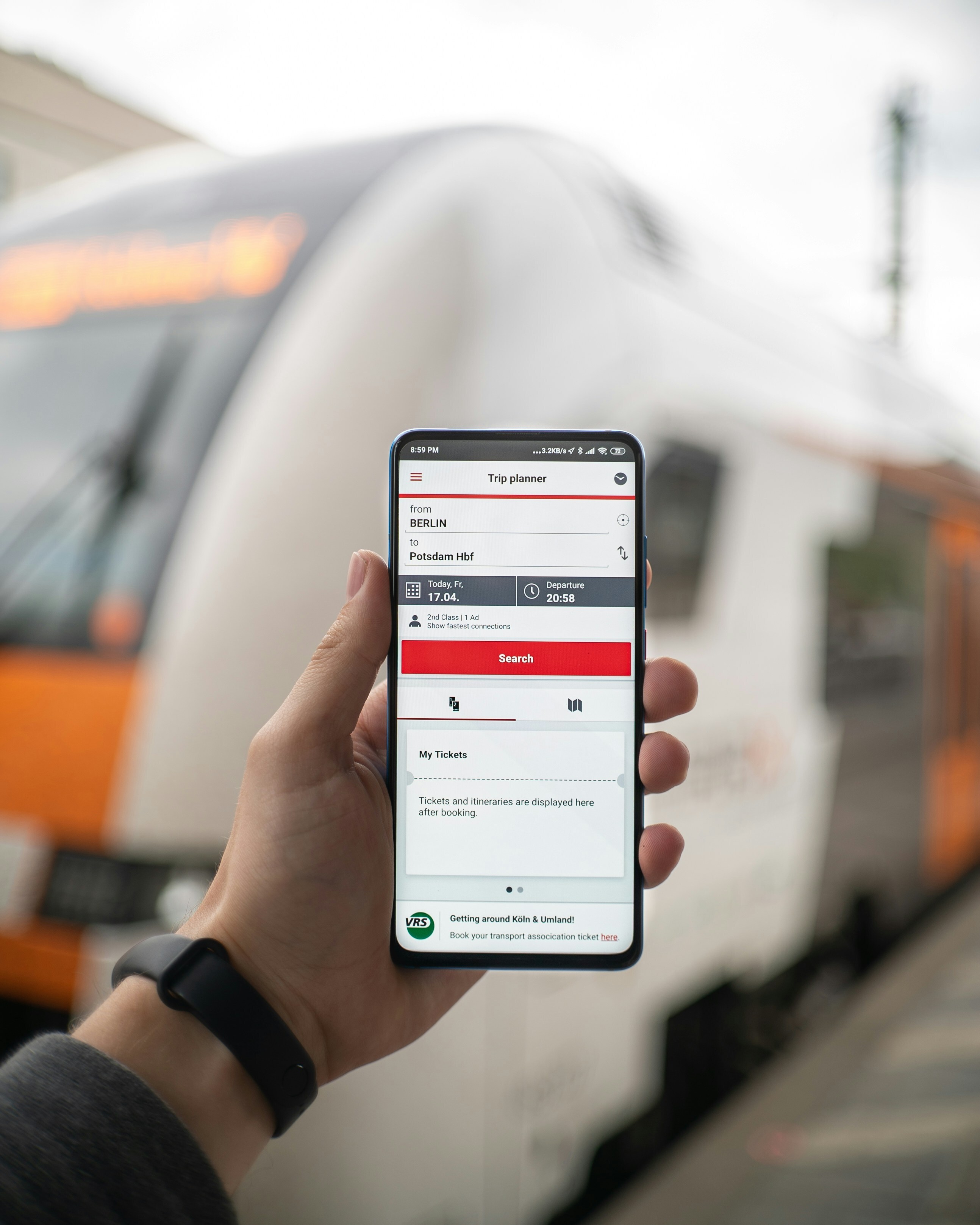
The concept of MaaS is to make journeys more convenient through streamlining planning and payment and allowing people to tailor journeys to their specific needs.
In its drive to meet decarbonisation and net zero ambitions the UK Government produced a Code of Practice for Mobility as a Service (MaaS) in 2023. This comprehensive framework focuses on convenience, accessibility and innovation to ensure that modern mobility apps meet the needs of the public. Indeed, the main objective is to make transport options accessible to all, paving the way for an interconnected, user-centric transport ecosystem.
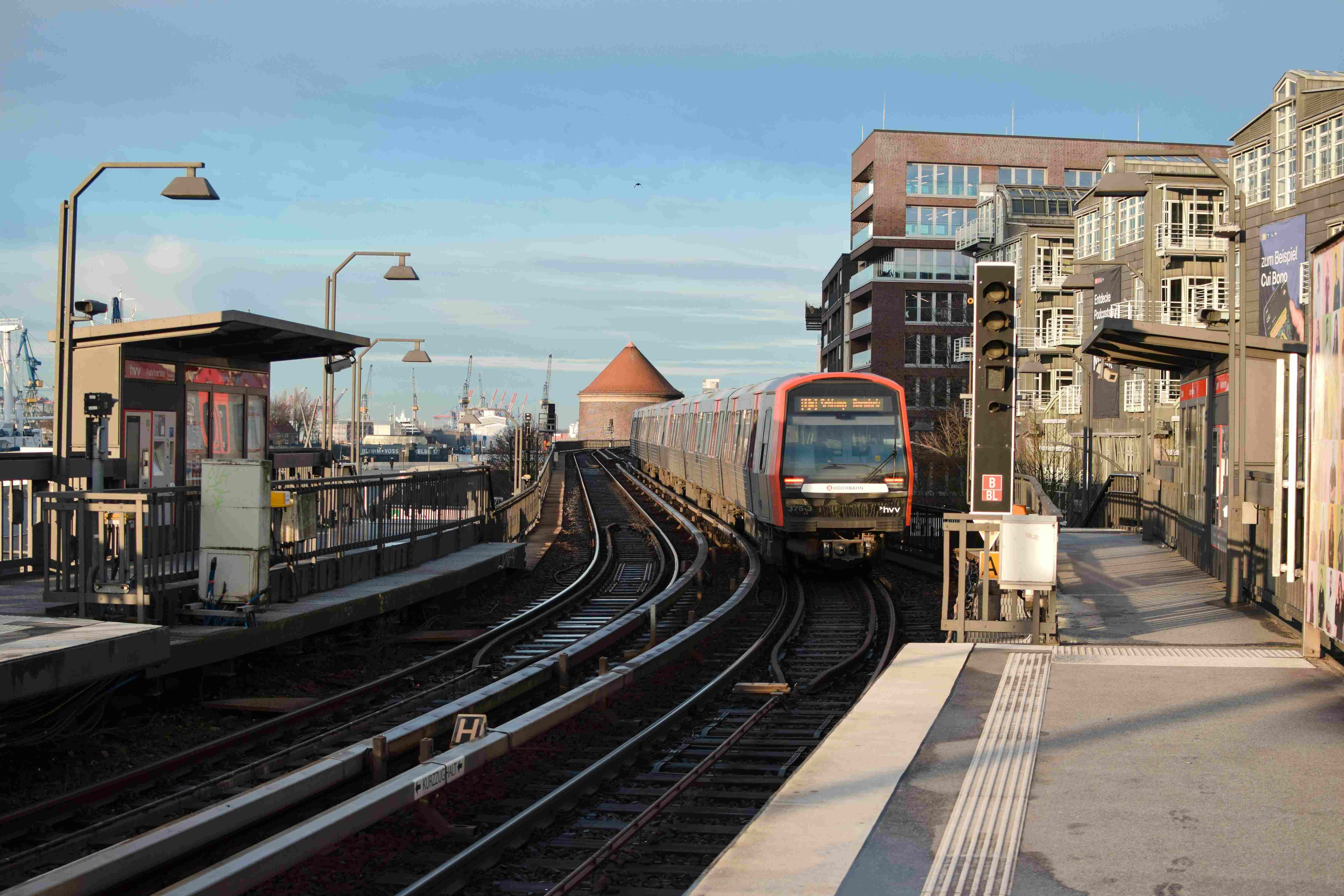
But how effective would such a system be in the UK? what impact would MaaS have globally particularly in remote locations and low income economies? And is the transport industry really ready to integrate this level of digital interconnectivity into its services?
To answer these an other questions about MaaS I spoke with Dr Kate Pangbourne, associate Professor of transport governance at the Institute for Transport Studies at Leeds University and Sharon Kindleysides, Transport engineer and board member of the European Logistics Association to get their views on what implications it might have for the UK transport sector, the impact it could have on society in terms of accessibility and cost, and what challenges it might face in the UK and beyond.
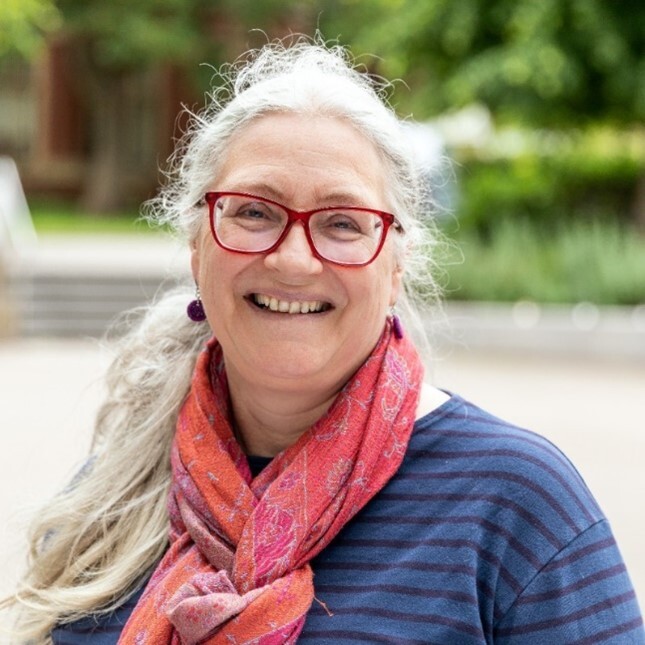
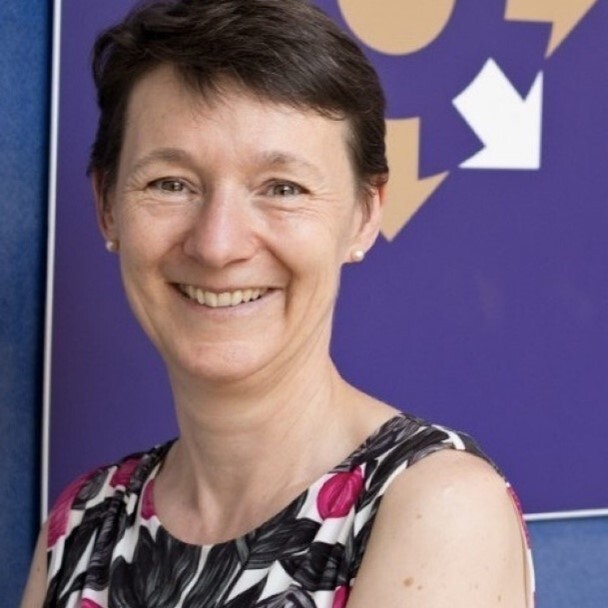
Dr Kate Pangbourne Sharon Kindleysides
Useful Links
We would love to hear your thoughts and comments on this episode. If you would like to get in touch, email us at podcast@imeche.org
You can find more information about the work of the IMechE at www.imeche.org

Wednesday Mar 06, 2024
Wednesday Mar 06, 2024
This week (6th and 7th March) sees the IMechE host its fourth hydrogen economy conference in London. The international event will focus on infrastructure challenges as well as the storage and management of hydrogen as part of a wider ‘green energy’ supply.

iStock Image
Given the UK Government’s ambition for a decarbonised power sector by 2050, which will see the share of renewables in our generation mix increase significantly, a stable supply from these somewhat variable energy sources, will become ever more important. The UK will therefore need substantial investment in its energy infrastructure to ensure that energy can be efficiently stored for days, months even years at a time.
Engineers across the globe are looking at a range of technologies which incorporate not just hydrogen but compressed air, molten salts, and synthetic fuels to determine how energy could be stored in different forms, or for different durations, ensuring that our energy requirements remain affordable, secure and stable while delivering on crucial emissions reductions.

Home 3-phase battery storage installation - H Hudson & Imp Electrical
In this month’s episode Helen talks with Professor Tony Roskilly Chair of Energy Systems at Durham University about the future of energy supply decarbonisation and what engineers are doing to address the challenges of energy storage, management and infrastructure of clean energy sources.
Professor Roskilly has over 30 years experience in the design, control, and operational optimisation of energy systems and energy management, and is a Fellow of the Institute of Marine Engineering, Science and Technology. He sits on the UK Government’s Hydrogen Advisory Council Research and Innovation Working Group,and is a Member of DfT Multi-Model Hydrogen Transport Hub Board.
Tony is also a Co-Director of the Durham Energy Institute, leading on Industrial and Internationalisation Strategy, and is the UK representative for the European Energy Research Alliance’s Joint Programmes for Energy Efficiency in Industrial Processes and Energy Systems Integration.
If that didn’t fill all of Tony’s time he also leads the UK hydrogen fuelled transportation network and is responsible for a large team at Durham University which leads national research on the decarbonisation of heating and cooling, focusing on the utilisation of solar, thermal and geothermal energy, thermal energy recovery, storage and utilisation and energy systems integration.
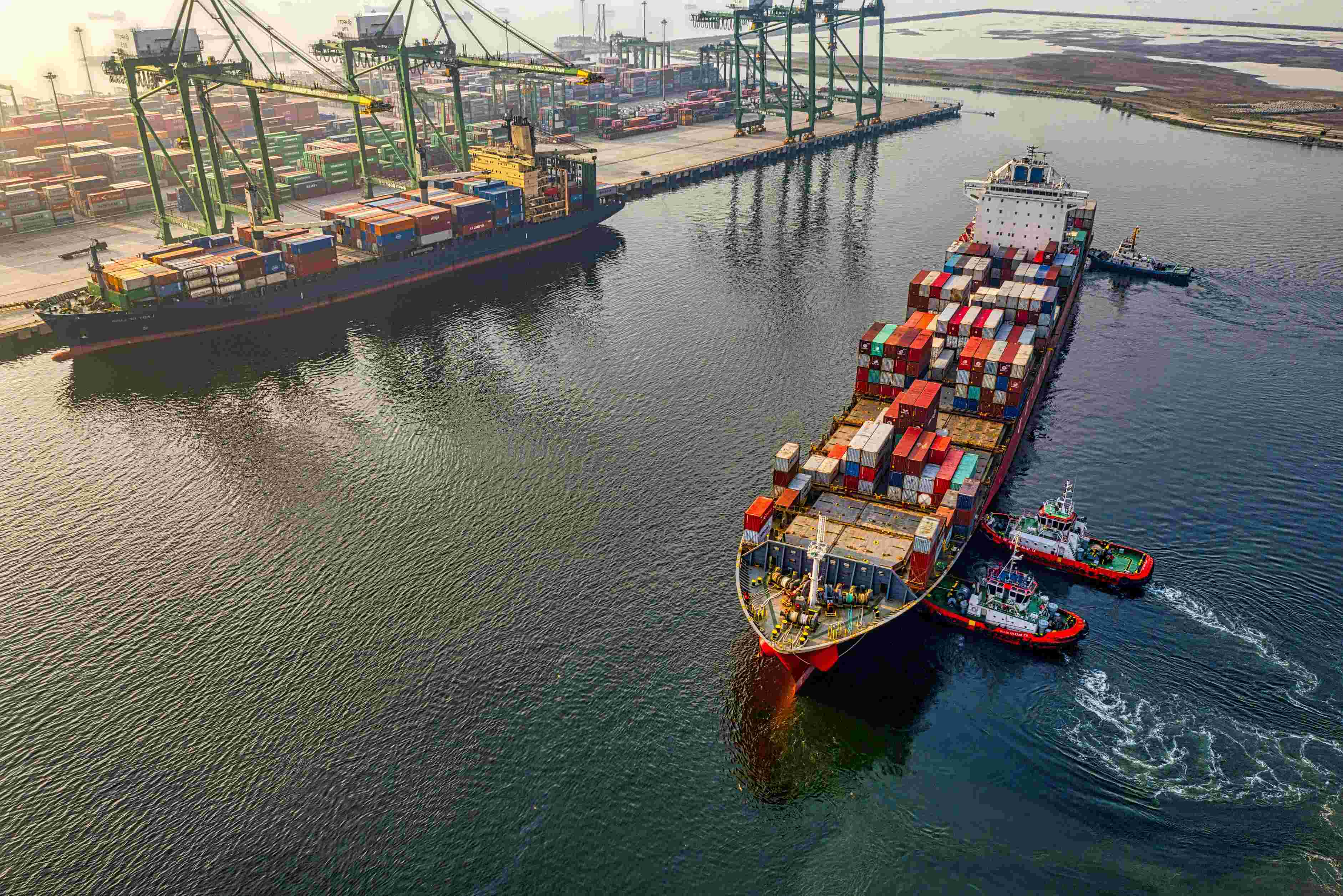
Unsplash free image
Useful Links
Making Waves: The Future of Shipping
We would love to hear your thoughts and comments on this episode. If you would like to get in touch, email us at podcast@imeche.org
You can find more information about the work of the IMechE at www.imeche.org

